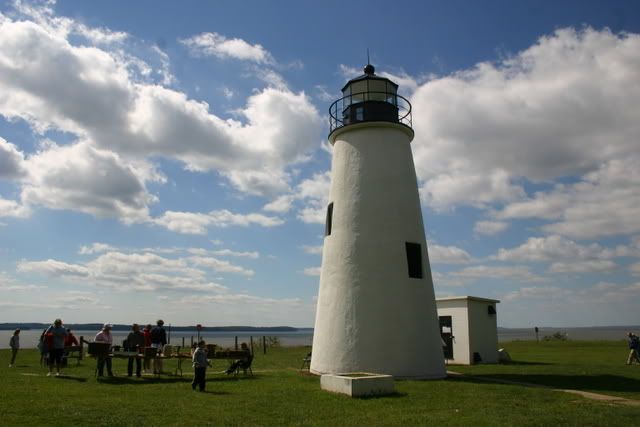CHESAPEAKE LOVERS.COM
Welcome To Chesapeake Lovers.Com!
Here's some interesting facts about the Chesapeake Bay.
The bay is 200 miles long and is the largest estuary in the United States.
It's width varies from just under 4 miles wide to 30 miles. It's average depth is 21 feet deep, but it reaches depths of 174 feet near Bloody Point, MD. It's 10 major rivers and 15,000+ streams, marshlands, and creeks make it a hot spot for many different birds, fish, and plant species.

The Bay is home to many different styles of lighthouses. This is the Turkey Point lighthouse. It's located at the end of Elk Neck State Park on cliffs about 50-100 feet above the bay where the Elk River meets the Susquehanna flats. The lighthouse helps ships see into the Elk River which then leads them into the C&D canal. The C&D canal connects the Chesapeake with the Delaware River and bay.

This lighthouse means a lot to Captain Slab. When I was a young boy spending summers with my parents and grandparents I used to wake up and fall asleep looking across the Elk River towards this lighthouse. The waves at night would sing me to sleep. Then loud booms from Aberdeen echoing through the river valleys would let me know it was time to awake.



The Chesapeake Bay is a place of evolving geology, ecology, economy, and culture. The rising waters from the melting glaciers of the Pleistocene age reached the mouth of the Chesapeake Bay about 10,000 years ago. Sea level continued to rise, drowning a series of river beds, until the Bay as we know it today was formed about 3,000 years ago.








Great stuff coming soon, Photos, News Articles, Historical Accounts, and Videos.
Even a marriage proposal at Turkey Point!
Chesapeake Lovers
Chesapeake City, MD 21915
info@chesapeakelovers.com
